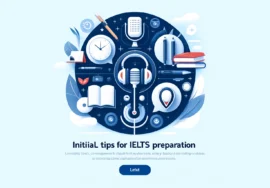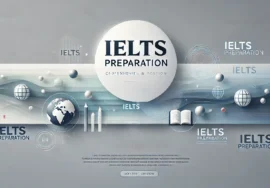
Planning for IELTS Success
Discover proven strategies and expert tips for planning your IELTS success. Learn how to approach each section, improve your skills, and maximize your score with effective study plans.
Planning for IELTS Success
Introduction
The IELTS exam is one of the most widely recognized English proficiency tests, essential for academic and professional opportunities worldwide. Achieving a high band score requires careful planning, as it allows candidates to systematically focus on each section and develop effective test-taking strategies. This guide provides a structured approach to IELTS preparation, covering time management, skill development, and goal setting to maximize performance.
Understanding the test format, identifying common pitfalls, and applying structured learning techniques can significantly boost a candidate’s chances of success. By breaking down each IELTS component, developing personalized strategies, and maintaining consistency in preparation, test-takers can improve both their language proficiency and test performance.
Understanding the Four Key Skills
The IELTS exam evaluates candidates based on four core language skills: Listening, Reading, Writing, and Speaking. Success requires dedicated practice for each skill individually while also integrating them holistically. Below is a detailed breakdown of how to master each section:
Listening
Listening comprehension is a crucial skill that requires focused practice.

Some effective ways to enhance your listening ability include:
- Engage with Diverse Audio Sources: Listen to podcasts, news reports, audiobooks, and lectures in English to get accustomed to different accents and speaking speeds.
- Practice Active Listening: Take notes while listening and try to summarize the main points.
- Familiarize Yourself with Question Types: Understanding the different types of questions in the IELTS Listening test—such as multiple choice, sentence completion, and map labeling—will help you develop targeted strategies.
- Use Transcripts: Reading along with audio transcripts can improve word recognition and pronunciation.
- Regular Practice Tests: Simulate exam conditions to build confidence and improve time management.
- Improve Concentration: Train yourself to focus on key details by summarizing the main ideas in a structured manner.
Reading
The Reading section requires candidates to process large amounts of text quickly and accurately.

Some effective strategies include:
- Develop Skimming and Scanning Techniques: Skimming helps identify the main idea, while scanning allows you to locate specific information quickly.
- Expand Your Reading Materials: Read academic journals, newspapers, and research articles to expose yourself to different writing styles and complex vocabulary.
- Practice with IELTS Sample Papers: Solving past papers will familiarize you with question formats and time constraints.
- Improve Your Vocabulary: Learn new words daily and understand their usage in context.
- Annotate and Summarize Texts: Mark key ideas and summarize paragraphs to reinforce understanding and retention.
- Analyze Question Types: Identify patterns in IELTS Reading questions to develop targeted answering strategies.
Writing
Writing requires clarity, coherence, and a strong command of grammar.

Here’s how to improve your performance in this section:
- Understand the Task Requirements: IELTS Writing is divided into Task 1 (report writing for Academic or letter writing for General) and Task 2 (essay writing). Know the specific requirements for each task.
- Practice Writing Timed Essays: Simulate real exam conditions by writing essays within the allocated time.
- Review and Edit Your Work: Always check for grammatical errors, coherence, and lexical resource usage.
- Use a Wide Range of Sentence Structures: Demonstrating grammatical variety can help you achieve a higher score.
- Expand on Ideas Effectively: Develop well-structured arguments with supporting evidence and examples.
- Study High-Scoring Responses: Analyze model answers to understand what contributes to higher band scores.
Speaking
Speaking fluently and confidently is key to scoring well.

Some effective ways to improve your speaking skills include:
- Engage in Regular Speaking Practice: Talk to native speakers or join IELTS study groups.
- Record and Analyze Your Speech: Listening to your recorded responses can help identify areas of improvement.
- Expand Your Topic Knowledge: The Speaking test includes general topics, so having a broad knowledge base will help you answer questions effectively.
- Focus on Pronunciation and Fluency: Work on articulation, stress patterns, and reducing hesitation.
- Use a Range of Vocabulary: Avoid repeating words and practice incorporating synonyms and varied expressions.
- Simulate the Test Environment: Practice answering questions under timed conditions to build confidence.
Setting Realistic IELTS Goals
Setting achievable goals is essential for effective IELTS preparation.

Candidates should first determine the required band score for their university or immigration needs. Based on this, they can establish daily and weekly study targets.
Some useful goal-setting strategies include:
- Determining a target score and breaking it down by section.
- Scheduling dedicated time for each skill.
- Tracking progress with mock tests and self-assessments.
- Identifying weaknesses and working on improvement areas.
- Creating milestone achievements to maintain motivation.
- Adjusting study methods based on performance trends.
Creating a Personalized Study Timetable
A well-structured study timetable is essential for consistent progress. Candidates should allocate study hours based on their current proficiency levels and availability. A sample study schedule may look like this:
| Day | Study Focus | Activity |
|---|---|---|
| Monday | Listening & Speaking | Practice listening exercises, record speaking responses |
| Tuesday | Reading & Writing | Skim and scan sample texts, write an essay |
| Wednesday | Mock Test | Complete a full IELTS practice test |
| Thursday | Grammar & Vocabulary | Learn new words, revise sentence structures |
| Friday | Listening & Reading | Review mistakes, practice comprehension |
| Saturday | Speaking & Writing | Engage in mock interviews, refine writing techniques |
| Sunday | Review & Rest | Analyze progress, relax, and revise notes |
Effective Study Techniques for IELTS Preparation
Several effective techniques can help candidates improve their IELTS performance:
- Time Management: Practice answering questions under timed conditions to simulate exam pressure.
- Error Analysis: Review mistakes in practice tests to understand and avoid common errors.
- Flashcards for Vocabulary: Use flashcards to build and retain new words effectively.
- Peer Learning: Join study groups or online forums to exchange tips and feedback.
- Regular Mock Tests: Simulating real exam conditions improves confidence and reduces anxiety.
- Grammar Reinforcement: Focus on sentence structures, tenses, and transitions for better clarity.
Common Mistakes and How to Avoid Them
Many IELTS candidates make common mistakes that hinder their performance. Here’s how to avoid them:
- Not Managing Time Properly: Always keep track of time and avoid spending too long on a single question.
- Ignoring Instructions: Carefully read and follow all instructions to avoid losing unnecessary points.
- Using Repetitive Vocabulary: Show lexical diversity by using a range of words and expressions.
- Speaking Too Fast or Too Slow: Maintain a natural pace and enunciate words clearly.
- Neglecting Proofreading: Always check written answers for grammar and coherence before submitting.
Conclusion
Success in the IELTS exam is achievable with a well-structured plan, consistent practice, and a strategic approach to learning. By setting clear goals, creating a personalized timetable, and implementing effective study techniques, candidates can significantly improve their chances of achieving their desired band score. Proper planning ensures that all four language skills are developed systematically, leading to a confident and well-prepared test performance. With dedication and smart preparation, IELTS candidates can not only reach their target scores but also strengthen their overall English proficiency for future academic and professional endeavors.








